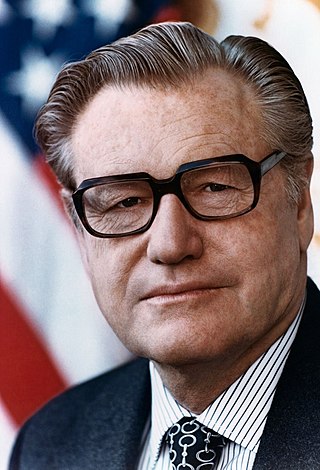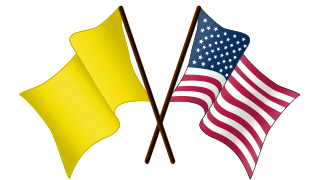A Tory is an individual who supports a political philosophy known as Toryism, based on a British version of traditionalist conservatism which upholds the established social order as it has evolved through the history of Great Britain. The Tory ethos has been summed up with the phrase "God, King, and Country". Tories are monarchists, were historically of a high church Anglican religious heritage, and were opposed to the liberalism of the Whig party.

The Republican Party, also known as the GOP, is one of the two major contemporary political parties in the United States. It emerged as the main political rival of the then-dominant Democratic Party in the 1850s, and the two parties have dominated American politics since then.
Social conservatism is a political philosophy and a variety of conservatism which places emphasis on traditional social structures over social pluralism. Social conservatives organize in favor of duty, traditional values and social institutions, such as traditional family structures, gender roles, sexual relations, national patriotism, and religious traditions. Social conservatism is usually skeptical of social change, instead tending to support the status quo concerning social issues.
American electoral politics have been dominated by successive pairs of major political parties since shortly after the founding of the republic of the United States. Since the 1850s, the two largest political parties have been the Democratic Party and the Republican Party—which together have won every United States presidential election since 1852 and controlled the United States Congress since at least 1856. Despite keeping the same names, the two parties have evolved in terms of ideologies, positions, and support bases over their long lifespans, in response to social, cultural, and economic developments—the Democratic Party being the left-of-center party since the time of the New Deal, and the Republican Party now being the right-of-center party.
A caucus is a meeting or grouping of supporters or members of a specific political party or movement. The exact definition varies between different countries and political cultures.

The Rockefeller Republicans were members of the United States Republican Party (GOP) in the 1930s–1970s who held moderate-to-liberal views on domestic issues, similar to those of Nelson Rockefeller, Governor of New York (1959–1973) and Vice President of the U.S. (1974–1977). Rockefeller Republicans were most common in the Northeast and the industrial Midwestern states, while they were rare in the South and the West.
Republicrat or Demopublican are portmanteau names for both of the two major political parties in the United States, the Republican Party and the Democratic Party, collectively. These derogatory names first appeared in the 1872 United States presidential election.

The Blue Dog Coalition, commonly known as the Blue Dogs or Blue Dog Democrats, is a caucus of moderate members from the Democratic Party in the United States House of Representatives. The caucus was founded as a group of conservative Democrats in 1995 in response to defeats in the 1994 elections. Historically, the Blue Dog Coalition has been both fiscally and socially conservative. At its peak in 2009, the Blue Dog Coalition numbered 54 members.
This article gives an overview of liberalism and radicalism in Spain. It is limited to liberal and radical parties with substantial support, mainly proved by having been represented in parliament. The sign ⇒ denotes another party in that scheme. For inclusion in this scheme it is not necessary that parties label themselves as a liberal or radical party.

In American politics, a Libertarian Republican is a politician or Republican Party member who has advocated libertarian policies while typically voting for and being involved with the Republican Party.
The Republican Party in the United States includes several factions, or wings. During the 19th century, Republican factions included the Half-Breeds, who supported civil service reform; the Radical Republicans, who advocated the immediate and total abolition of slavery, and later advocated civil rights for freed slaves during the Reconstruction era; and the Stalwarts, who supported machine politics.

The Kansas Republican Party is the state affiliate political party in Kansas of the United States Republican Party. The Kansas Republican Party was organized in May 1859.
In American politics, a conservative Democrat is a member of the Democratic Party with more conservative views than most Democrats. Traditionally, conservative Democrats have been elected to office from the Southern states, rural areas, and the Great Plains. In 2019, the Pew Research Center found that 14% of Democratic and Democratic-leaning registered voters identify as conservative or very conservative, 38% identify as moderate, and 47% identify as liberal or very liberal.

The Republican Main Street Partnership is a nonprofit organization that raises funds to support politicians in the moderate wing of the Republican Party. The Republican Main Street Partnership does not advocate for legislation but offers networking and mentorship opportunities and provides a forum for discussion. The Partnership is affiliated with a super PAC called Defending Main Street. The Partnership is also affiliated with the Republican Main Street Caucus, a Republican congressional member organization that takes pragmatic conservative positions.

The Republican Party, also known as the GOP, is one of the two major political parties in the United States. It is the second-oldest extant political party in the United States after its main political rival, the Democratic Party.

The Democratic Party of the United States is a party composed of various factions. The liberal faction supports modern liberalism that began with the New Deal in the 1930s and continued with both the New Frontier and Great Society in the 1960s. The moderate faction supports Third Way politics that includes center-left social policies and centrist fiscal policies. The progressive faction supports progressivism.
The Pew Research Center political typology is a political spectrum model developed by the Pew Research Center. It defines a series of voter profiles that identify specific segments of the electorate. First released in 1987 by the Times Mirror Company, the typology is updated every few years to reflect recent changes in the American electorate.
The Conservative Party of Virginia was a United States political party in the state of Virginia during the second half of 19th century. It centered on opposition to Reconstruction. During its history, the party was successful in electing six congressmen to the U.S. House of Representatives, all during the 41st Congress. The party was related to similar conservative movements in other states, combining Liberal Republicans and repentant Democrats looking to improve their image as "friends of the black people" on a national level. The movement was also closely tied to the "New Departure" movement of Virginia statesman William Mahone. The Conservative Party's efforts ultimately divided the Republican Party in the state and caused its political power in Virginia to diminish.
Progressive conservatism is a political ideology that attempts to combine conservative and progressive policies. While still supportive of capitalist economy, it stresses the importance of government intervention in order to improve human and environmental conditions.
Conservative Republicans was a designation applied in reference to a faction of the early Republican Party during the American Civil War and Reconstruction era which advocated a lenient, conciliatory policy towards the South in contrast to the harsher attitudes emphasized by Radical Republicans. "Conservatives" such as Pennsylvania senator Edgar Cowan generally opposed efforts by Radical Republicans to rebuild the Southern U.S. under an economically mobile, free-market system.







